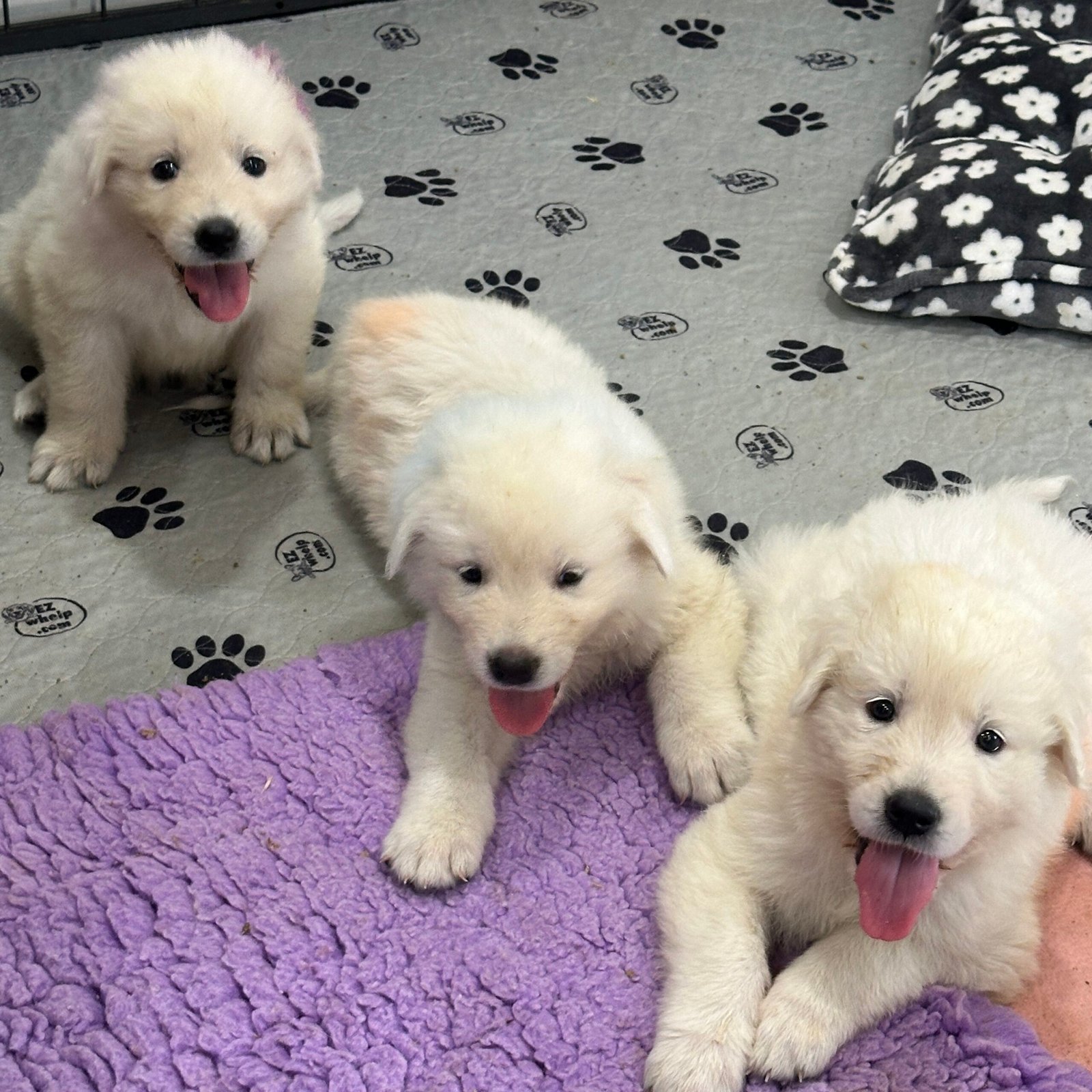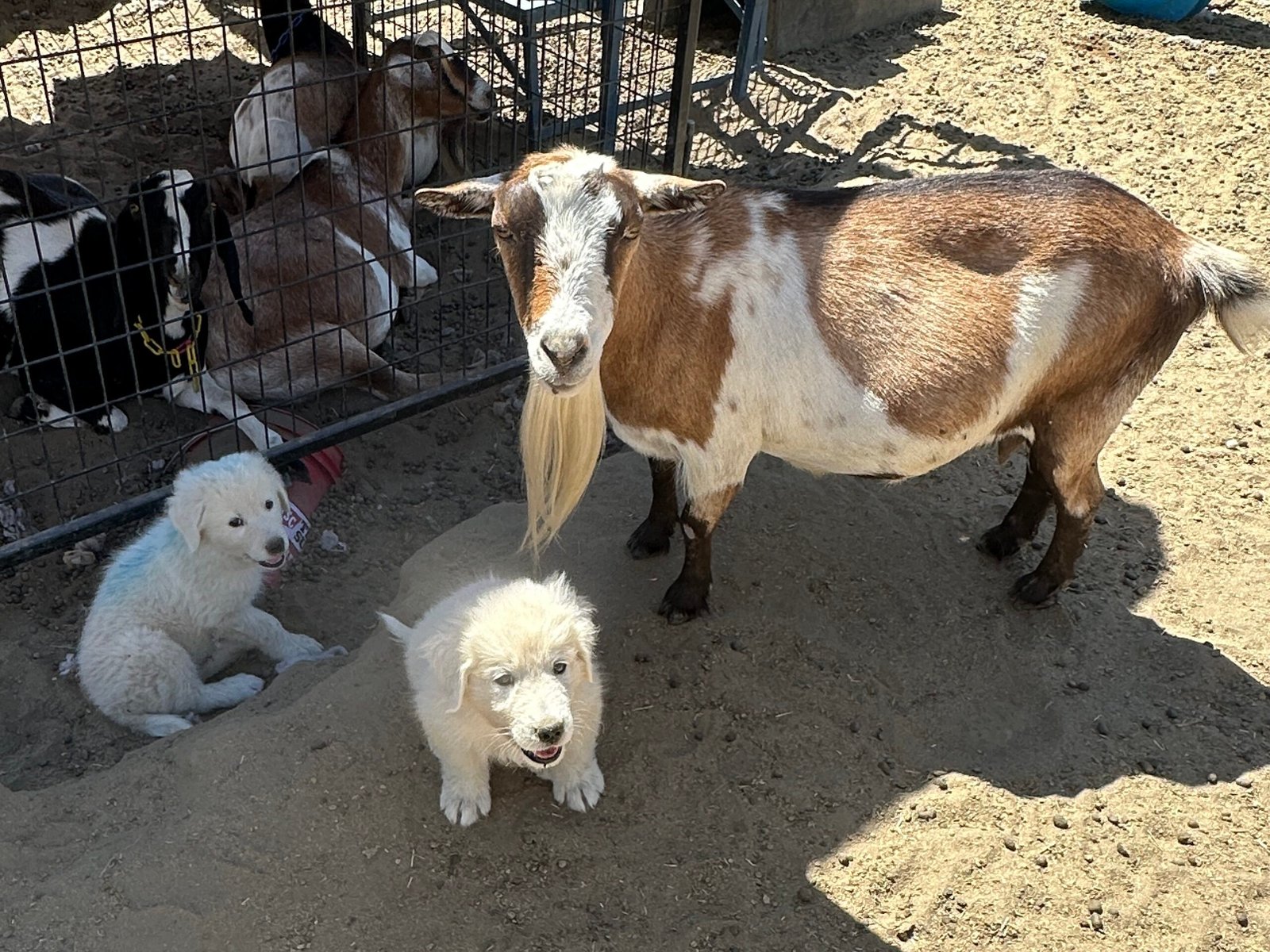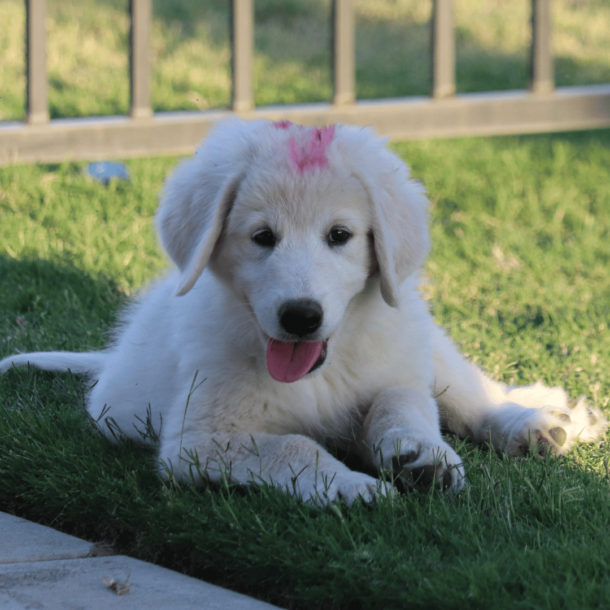Last Updated on October 25, 2025 by Kim Crawmer, KPA CTP, LFDM
Why proper vaccination and parasite prevention during weeks 6–8 sets the foundation for a lifetime of health.
At six weeks old, our current Maremma Sheepdog litter reached a critical milestone in their livestock guardian dog health journey—their first Neo-par vaccination and the start of our carefully designed puppy parasite prevention protocol.
This might sound like routine veterinary care, but the timing, products, and environment we use are the result of years of refining what truly works for LGD puppies. After experiencing both successes and heartbreaking losses, I’ve learned that early, prevention-focused care is the foundation of lifelong health and working success.
Because even the best-trained livestock guardian dog can’t do their job if they’re not healthy enough to thrive.
📚 LGD Puppy Development Series:
- Part 1: The Critical Window: Why early socialization makes or breaks your LGD
- Part 2: From Helpless to Hero: the Remarkable Journey of LGD Development
- Part 3: The Puppy Parlor Method: How We Raise and Socialize LGD Puppies
- Part 4: Puppy Socialization for LGDs: Why Human Interaction Builds Better LGDs
- Part 5: Livestock Integration for LGD Puppies: From Observation to Interaction
- Part 6: Building Immunity: The LGD Health Protocols That Protect Your Investment
- Part 7: Child Socialization for LGDs: Why it's Crucial for Family Farms
- Part 8: LGD Socialization: Meet Genny, the Maremma Mentor Who Perfects Every Puppy's Education
- Part 9: Beyond the Puppy Parlor: What Your LGD Needs Next
The Evolution of My Puppy Health Protocols
I’ll be honest—my current health management approach looks nothing like what I did ten years ago.
From Barn Setups to the Puppy Parlor
In my barn-raising days, I was constantly fighting parasite battles: aggressive deworming every two weeks starting at two weeks old, reactive treatments when puppies showed symptoms, thousands spent on veterinary interventions, and the heartbreak of losing puppies despite doing “everything right.”
Then came the Puppy Parlor, and everything changed—not just for socialization, but for health management.
How Environment Shapes Health Outcomes
Then (Barn Setup):
Deworming at 2, 4, 6, 8, 10, 12 weeks
Constant parasite pressure from dirt floors and standing water
Reactive crisis management
Aggressive medication protocols stressing developing systems
Now (Puppy Parlor System):
Skip 2 & 4 week deworming entirely (no roundworm issues in our climate)
Proactive prevention through environmental design
Gentler protocols with better results
Focus on building natural immunity
The difference? A clean, controlled environment that prevents problems rather than just treating them.

Puppy Vaccination Schedule: Neo-par and Beyond
Why Neo-par at Six Weeks Matters
At six weeks, every puppy in our current litter receives their Neo-par vaccine.
Neo-par protects against canine parvovirus, one of the most devastating diseases affecting young puppies. Unlike the standard 5-way vaccine given at eight weeks, Neo-par can be administered as early as three weeks (but we choose six weeks) because it’s specifically designed to work even when maternal antibodies are still present.
Why this matters: Puppies receive temporary immunity from their mother’s milk, but this protection usually fades somewhere between six and twelve weeks—creating a dangerous vulnerability window right when they’re most active and exposed to potential pathogens.
Our LGD Vaccination Timeline
6 weeks: Neo-par (parvo protection during vulnerable window)
8 weeks: First 5-way (distemper, adenovirus 1 & 2, parainfluenza, parvovirus)
12 weeks: Second 5-way booster
16 weeks: Final 5-way booster (for puppies still here)
This protocol ensures continuous protection as maternal antibodies fade and the puppy’s own immune system takes over.

Puppy Parasite Prevention Protocol
Cocci Guard: Natural Coccidiosis Prevention
Starting at three weeks, when puppies begin eating solid food, I mix Cocci Guard into their puppy mush.
Cocci Guard is a coccidiosis preventive (cocciodiostat) used with goats and sheep. Since implementing this simple addition:
Zero cases of coccidiosis in puppies
No need for aggressive medication protocols like toltrazuril
Healthier gut development during the critical weaning period
This is prevention, not treatment—and it works beautifully. (If a puppy does contract coccidiosis I would still treat with Toltrazuril, but I have had zero cases of coccidiosis since building the Puppy Parlor and implementing the Cocciguard protocol.)
The 5-Day Safeguard Program for Giardia
At six weeks, puppies begin a five-day course of Safeguard (fenbendazole) for giardia prevention.
This protocol generally repeats at eight, ten, and twelve weeks—the critical window when giardia tends to emerge in young dogs.
Why Safeguard specifically?
Effective against giardia and common intestinal parasites
Well-researched safety profile
Proven results in our environment
Why skip the early dewormings?
Since building the Puppy Parlor with its clean surfaces and controlled environment, we simply haven’t seen roundworm issues. (We never had roundworm issues in the barn, but did have giardia and coccidiosis.) The California climate and our management system don’t create the conditions where early roundworm treatment is necessary. (My goats rarely need to be dewormed, either.)
This is science-based adaptation—using what actually works in our specific situation rather than blindly following generic protocols.

The Environmental Advantage
Why Clean Design Beats Constant Medication
Here’s what most breeders don’t understand: environment impacts health as much as genetics or medical care.
High-Risk Environments:
Dirt floors that harbor parasite eggs
Standing water (troughs, puddles)
Outdoor exposure to wildlife feces
Poor drainage and moisture retention
High-density livestock proximity
Our Puppy Parlor Design:
Easy-clean surfaces that don’t harbor parasites
Excellent drainage systems
Climate control reducing moisture
Controlled livestock exposure
Regular sanitation protocols
The result? A 95% reduction in parasite issues compared to barn raising, allowing gentler treatment protocols with better outcomes.

Why the 6–8 Week Window Is Critical
What’s Happening Inside the Puppy
Maternal antibodies fading
Puppy’s own immune system activating
Weaning stress on digestive system
Increased environmental exposure
Rapid physical growth demanding resources
Our Protection Goals
Bridge the immunity gap with Neo-par
Support gut health during weaning transition
Prevent parasite interference with development
Build natural resilience through controlled exposure
Avoid overwhelming developing systems
Get this wrong, and you compromise everything else you’ve done right in socialization and development.

The Livestock Connection: Lessons from the Farm
My integrated farm approach gives me advantages most dog breeders don’t have.
Years of managing livestock health taught me:
Prevention beats treatment every time
Environment determines parasite pressure
Natural approaches work when systems support them
Individual animals respond differently to protocols
Observation catches problems before crisis
Using Cocciguard in puppies came directly from my goat management experience. The same prevention-focused mindset that keeps my dairy herd healthy protects my Maremma puppies.
This is one more way my working farm background creates better outcomes than hobby breeders or kennel operations.

Professional Organization: The System Behind the Protocols
Proper health management requires more than just knowledge—it requires meticulous record-keeping and organization.
After years of tracking puppy health records on paper, calendars, and spreadsheets, I finally invested in professional breeding management software that transformed how I manage every aspect of puppy health and client communication.
I use Breeder Cloud Pro to manage my entire breeding program, including:
- Complete litter tracking from heat cycles to pregnancy through placement
- Individual puppy health records (vaccinations, dewormings, vet visits)
- Automated protocol scheduling so nothing gets missed
- Client management and contract delivery
- Digital health record access for new owners
How It Works for Health Protocols
When a litter is born, I create their health protocol in the system:
- Neo-par at 6 weeks
- 5-day Safeguard protocol at 6, 8, 10, 12 weeks
- 5-way vaccines at 8, 12, 16 weeks
- Any additional treatments or vet visits
As I complete each milestone, I check it off in the system. No more wondering “Did I deworm them Tuesday or was that last week?” No more lost paper records or forgotten calendar reminders.
Everything is tracked digitally, accurately, and permanently.
The Pet Portal: Digital Records for Life
When families pick up their puppies, they receive access to the Pet Portal—a secure online system where they can:
- Download complete health records anytime
- View vaccination history and schedules
- View and sign their puppy contract
- Access and print their signed contract
- See upcoming health care recommendations
- Keep everything organized in one digital location
No more lost paper records. No more calling me asking, “When was the last vaccine?” No more scrambling to remember dates when they visit their veterinarian.
Everything is right there, downloadable and printable whenever they need it.
I’ve even created a tutorial video showing new puppy families exactly how to access and download their records, because having the system is only useful if people know how to use it.
Professional Standards Cost Money
Full transparency: This software isn’t free or cheap. I pay over $100 annually for Breeder Cloud Pro, plus $30 for the goat software add-on, and it’s worth every single penny.
I use a second software, Dog Breeder Pro, for tracking other aspects of my breeding program. That one is a bit more expensive but has features that Breeder Cloud Pro doesn’t. (Like pedigree and health record tracking, for making breeding decisions.) They complement each other nicely and ensure nothing slips through the cracks.
This is one more way professional, organized breeders distinguish themselves from people trying to do everything as cheaply as possible.
When you invest in proper tools, you get:
- Fewer mistakes and missed treatments
- Better health outcomes for puppies
- Professional presentation to clients
- Permanent, accessible records
- Peace of mind that nothing falls through the cracks
Hobby breeders working from handwritten notes and paper files might save money on software, but they’re gambling with puppy health and client satisfaction.
Professional breeders understand that organization is as important as knowledge. You can know exactly what puppies need—but if you can’t track, schedule, and document it reliably, that knowledge doesn’t translate into results.
What to Ask Any LGD Breeder About Health Protocols
Smart Buyer Questions
What is your complete vaccination schedule?
What parasite prevention protocols do you use?
How has your environment affected health management?
Can you show health records from multiple litters?
What’s your track record with parvo, giardia, and coccidiosis?
How do you adapt protocols based on results?
Red Flags to Watch For
“I just do whatever the vet says” (no informed strategy)
Frequent health crises or losses
Reactive rather than preventive approach
Can’t explain rationale behind protocols
No environmental health management
Generic protocols not adapted to their situation
Your puppy’s long-term health starts with the breeder’s prevention strategy.

The Complete Picture: Health as a System
Health protocols don’t exist in isolation—they’re integrated with everything else:
Clean environment reduces parasite pressure
Proper nutrition supports immune development
Stress management prevents illness
Genetic health testing prevents inherited disease
Socialization protocols build behavioral resilience
Every element works together to create puppies that are healthy, confident, and ready to thrive in their working homes.

Coming Next:
As our puppies continue through their critical development period, I’ll introduce you to the adult dog who puts the finishing touches on their education.
You’ll meet my star puppy mentor and see exactly how positive canine guidance teaches young livestock guardians everything they need to know about being exceptional protectors.

🐶 FAQ: LGD Puppy Health Protocols
When should LGD puppies get their first vaccination?
At six weeks, we administer Neo-par to protect against parvovirus during the most vulnerable immune window.
How do you prevent coccidiosis naturally?
We use Cocci Guard starting at three weeks—no harsh treatments, no outbreaks, just steady prevention.
Why skip early dewormings?
Because our environment doesn’t require them. Clean, controlled spaces prevent roundworms naturally without overmedicating young puppies.








